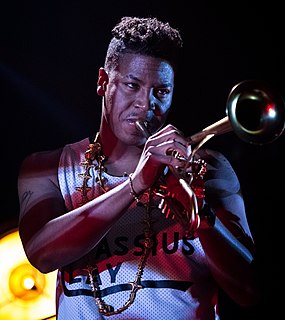Top 323 Interacting Quotes & Sayings - Page 6
Explore popular Interacting quotes.
Last updated on April 16, 2025.
Meaning can only be understood in relation to its environment. Therefore, the words only make full sense in context... There are no absolutes, there is no meaning without relationships, everything is not only interacting but interdependent. The kahunas use this idea to help give a person a powerfully secure sense of significance, while at the same time teaching him that to heal himself is to heal the world, and to heal the world is to heal himself. This is not a loss of individuality, but an understanding that individuality itself is a relationship with the environment.
What we're doing now, is to try to eradicate the limited notion of how people are interacting with each other through hyper-racialized ideas. A lot of it deal with, as an example, genre. If I ask you to visualize a trap musician or a hip-hop musician, you'll see one thing. If I say visualize a western classical musician, you'll see a very different thing. A lot of how music is disseminated to us is hyper-racialized. It's not something that we think about all the time, but if you take a minute to look back, it's why you get this argument when there's a white rapper.
I think capitalism will not disappear, but it's going to increasingly not be the exclusive arbiter of economic life. It's going to have to find value in interacting with the sharing economy on many levels. And this hybrid system that's already emerging among millennials is going to be a mature system where, by midcentury, part of the day will be in the capitalist market, part of the day in the sharing economy, depending on your marginal costs.
All of my friends are really good dancers, which was initially why I never danced - we'd go out and they would kill it and I'd be like, "Yeah, I'm just gonna sit at the bar." I broke my foot, and I couldn't run for a year, but I realized I could kind of dance. It reminded me how amazing dance is; it's so in tune with music - it is music. It's a physical expression of whatever music is. On stage, you're interacting with things - physical things. So I've really started to like and notice the way people move with music.
What serialized cable dramas have given us is the opportunity to not simply tell the same story with slightly different words and different costumes, every week. people are really mining the ability of storytellers to tell a long form story that goes from A to Z, and to trust that an audience will follow that. If they miss it, over the course of the week, they can watch it online or buy the DVD. There are so many different ways of interacting with it. Storytelling in television is getting more complex and more nuanced.
We scientists have way too much a tendency to simplify problems. I guess it actually comes to us naturally. Take the simplest unit, separate out all the confusing, external factors. Study it. Make sure you understand it. And in psychology that means the person studying the individual. But if you want to study our social nature, if you want to study processes that will lead to war and peace, you don't learn all that much by looking at the single individual. A lot of the important things are emergent facts about us, things that you can only see when you get a lot of us interacting.
I think that I write much more naturally about characters in solitude than characters interacting with others. My natural inclination - and one that I've learned to push against - is to give primacy to a character's interior world. Over the three books that I've written, I've had to teach myself that not every feeling needs to be described and that often the most impactful writing more elegantly evokes those unnamed feelings through the way characters speak and behave.
I love to just listen and watch. I could happily watch a security camera at a store. Often during a day I'll see a guy selling pretzels or an argument that somebody's having on a stoop and I'll think, "Oh I wish I had my camera, I wish I could capture this moment." There's something about people being people and interacting that can be so beautiful when it's framed by a camera. That desire to capture people as they are, and the stubbornness to keep going when they don't necessarily want you to capture them being who they are, are key.
I've gotten a lot of exposure for my writing. My writing blog has gotten over 1000 unique hits since the Observer piece (quite a lot as before it was something like 20 people a day if I was lucky.) But more importantly the coverage exposed me to and so has allowed me to connect with a lot of new people I really enjoy interacting with.
A true community consists of individuals - not mere species members, not couples - respecting each others individuality and privacy while at the same time interacting with each other mentally and emotionally - free spirits in free relation to each other - and co-operating with each other to achieve common ends. Traditionalists say the basic unit of "society" is the family; "hippies" say the tribe; noone says the individual.
When you cut it up, put the pieces in your mouth and swallowed them, the British hamburger shaped itself to the bottom on your stomach like ballast, while interacting with your gastric juices to form an incipient belch of enormous potential, an airship which had been inflated in a garage. This belch, when silently released, would cause people standing twenty yards away to start examining the soles of their shoes. The vocalized version sounded like a bag of tools thrown into a bog.
Something that we call developing the third eye in others. The eye is that people have intention when they're interacting, and often don't realize that there is an impact for everything that they do. The littlest thing, from scratching their head back here. This is, universally, "I don't understand what you said." That's what the scratch behind the ear means. If we know that, it's a whole other level. I could go back and say, "Let me do this again, because I'm seeing that it's not fully registering." We should be teaching these to people, is what I'm saying.
To our human minds, computers behave less like rocks and trees than they do like humans, so we unconsciously treat them like people.... In other words, humans have special instincts that tell them how to behave around other sentient beings, and as soon as any object exhibits sufficient cognitive function, those instincts kick in and we react as though we were interacting with another sentient human being.
We are little animals walking on the ground, we have a certain life time, we are acting and interacting with different people, and we are trying to build things, but we are just some sort of virus compared to the entire sky. You always have to remember that the moon, the earth, the sun, they are like the real universal objects. We are just passing by, and it makes life more beautiful to think that way. More relaxing to think that way, that nothing is really important, because you give yourself much more confidence and you forgive yourself more things when you think about that.
I had to be on the set for 'Who Framed Roger Rabbit' because my character was interacting with Bob Hoskins. It's a lot of 'hurry up and wait.' So there I was, at 2 a.m., sitting in a trailer at Griffith Park trying to stay awake. And I said to myself, 'This stinks.' The way I do it is better. I go into the studio about 10 a.m. There's no makeup to worry about. I can wear whatever I want. As soon I get there, I'm good to go. I record my stuff and go home.
The process of socialization is nowhere near complete at age five or six, when modern children start spending up to half their waking hours taking their cues from other people's children. Because they accompany their parents' daily routine, homeschooled kids spend plenty of time interacting with people of all ages, which I think most people would agree is a far more natural, organic way to socialize.
as a physician I examine the dying planet as I do a dying patient. The earth has a natural system of interacting homeostatic mechanisms similar to the human body's. If one system is diseased, like the ozone layer, then other systems develop abnormalities in function - the crops will die, the plankton will be damaged, and the eyes of all creatures on the planet will become diseased and vision impaired.
We can cooperate more easily with those who more easily intelligible to us, who are more familiar to us. But the advantages of specialization of labor often push us in the direction working with people who have different strengths and viewpoints than we do. I think that this is one major reason why moralities are always subject to change, because some of the people we cooperate with are going to be different from us in ways that often lead them to have different value orientations than we have; and interacting with them can change us.
Consequential strangers help us stretch beyond the relatively rigid boxes that the people who have known us the longest - our family and close friends - often put us into. Through interacting with people who do not know us as well, we are more free to experiment with ourselves, and less likely to have our new behaviors and roles reflected back to us by people who object, 'But that's not like you!'
Once I started writing all the time and interacting with poets, I made a conscious decision to identify myself as a poet. It's funny how much a single word can provide focus and direction. As soon as I claimed that identity, I started clearing more and more space for poetry in my life and applying poetic tools to other areas of my life. The world became a different place, and I witnessed it through different kinds of eyes.
One of the great things about being commander in chief is getting to know our men and women in uniform in a very intimate way, whether it's visiting Walter Reed and seeing our wounded soldiers, or being on a base and talking to families, or interacting with them on missions. They're the best of the best: always thinking about the mission, not thinking about credit, not thinking about who's up front.
We must recognise - both Muslims and non- Muslims, that the Koran is a text. We need human engagement with that text, so we have to understand that the rulings and the legal rulings are produced are channelled through the human mind, it's an interpretive act of a human being engaging and interacting with a text producing legal results. Because of that it's susceptible to flaws, it is not perfect. Nobody has perfect access to the divine will.






















